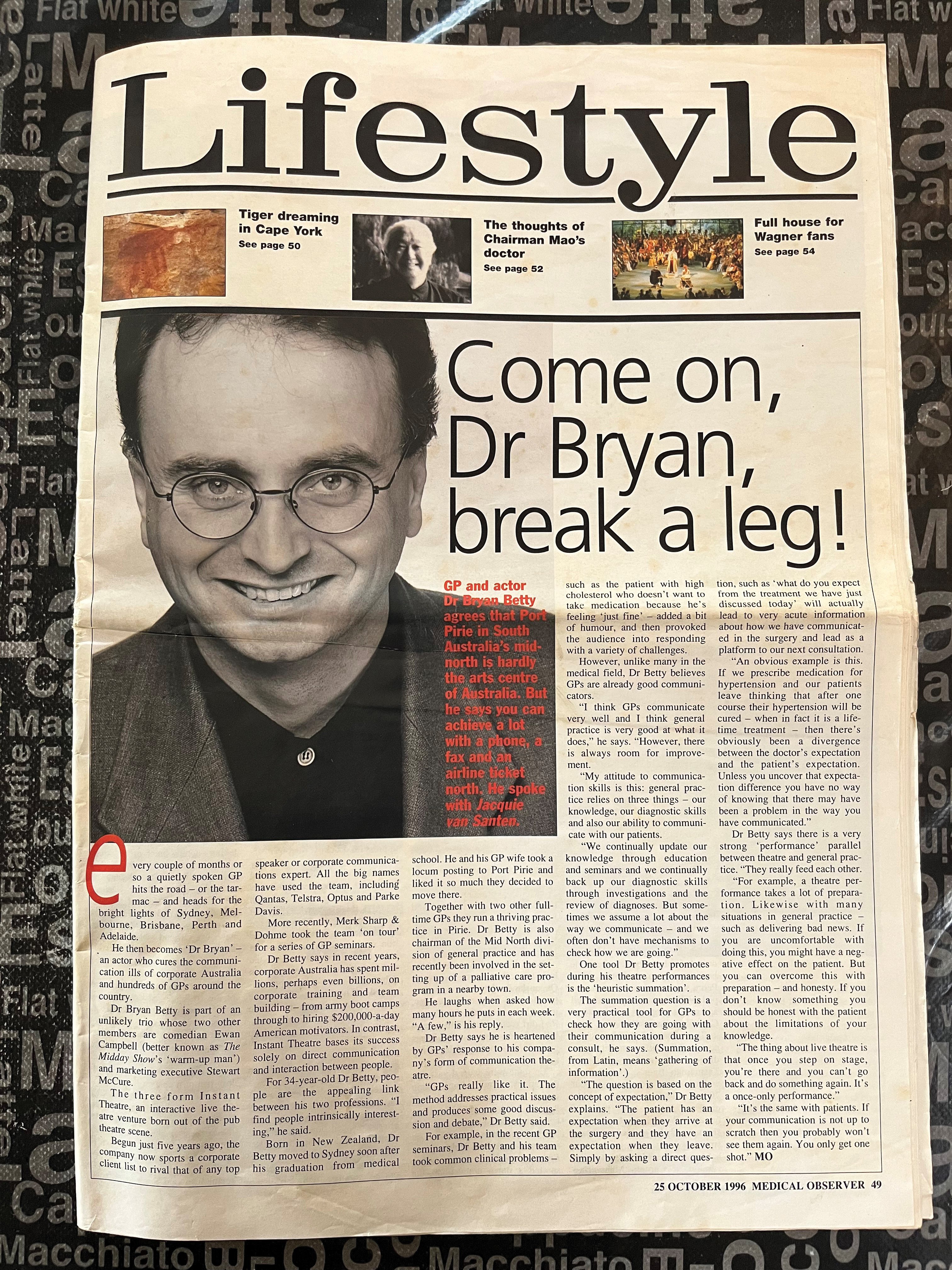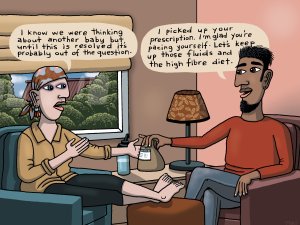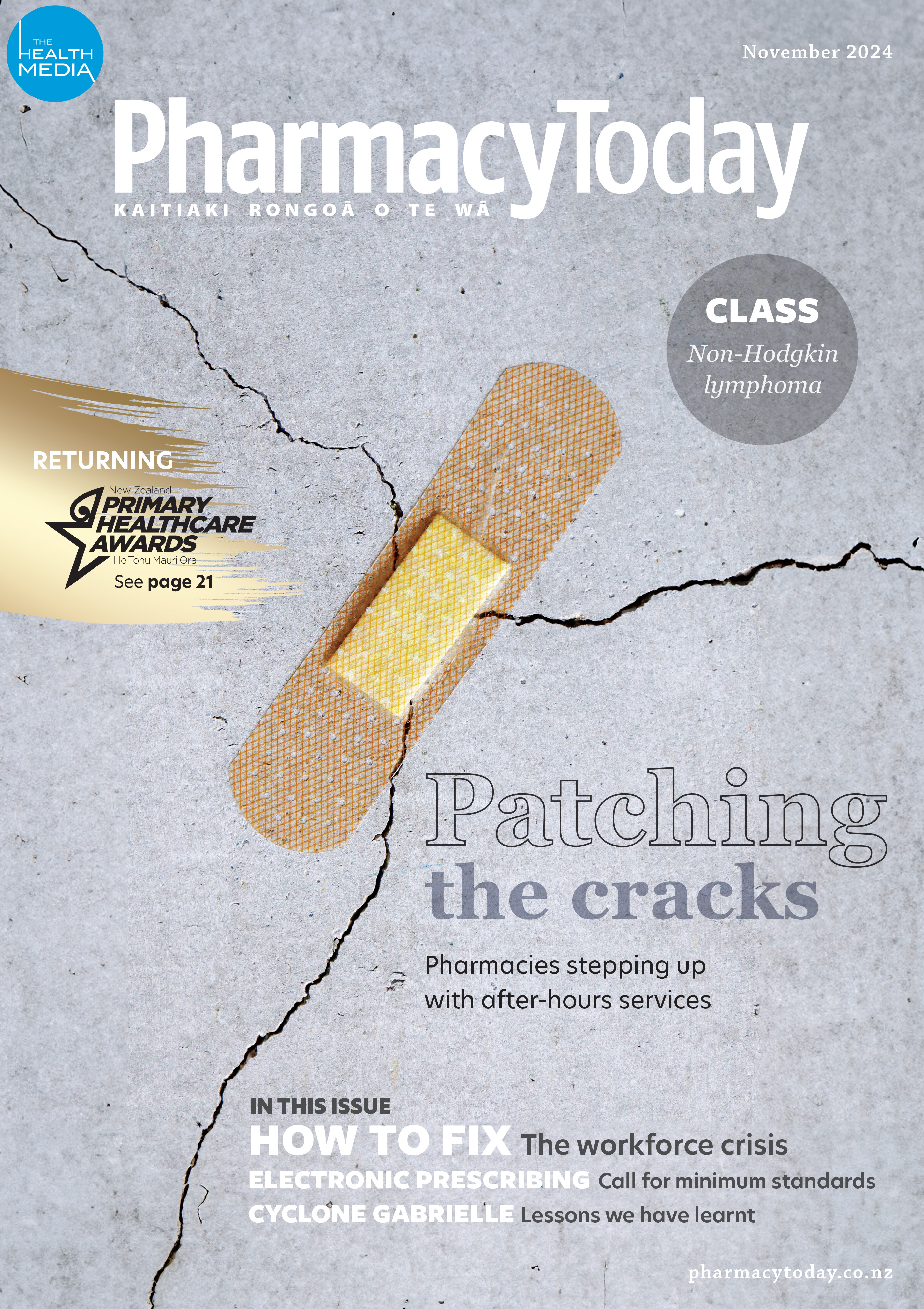Academic pharmacist Nataly Martini highlights the importance of understanding non-Hodgkin lymphoma and pharmacists’ roles in managing this condition
THE LIFE OF BRYAN: Actor, GP, advocate: Will the real Dr Betty please stand up?
THE LIFE OF BRYAN: Actor, GP, advocate: Will the real Dr Betty please stand up?

Welcome to Pharmacy Today's Summer Hiatus - our seasonal content schedule while Pharmacy Today staff take their summer break.
Today, we've got a profile of Bryan Betty, a man much in the news over the past couple of years. Here, New Zealand Doctor Rata Aotearoa reporter Alan Perrott talks to specialist GP Bryan Betty about his stoical mother, Catholic school education, and stints in improv theatre and mining-town doctoring
Bryan Betty is the “yes man”.
Dr Betty says he finds challenges hard to resist, especially when they take him to interesting places and, in the absence of an actual life plan, he remains happy to hand the wheel to random opportunity.
So, with the country’s first COVID-19 lockdown looming, he had cause for optimism that what could be done, was being done.
General practice had said yes to turning the way it worked upside down, almost overnight, with care going virtual and community testing stations being built from scratch. Improvising was “exactly the right thing to do”, says Dr Betty, given patient anxiety and the need to avoid waiting rooms becoming petri dishes.
To have said no would have been about inertia and not seeing the bigger picture. And that wouldn’t do.
Enter the Ministry of Health. No, it said, primary care would not be involved in the initial planning for vaccinations, and no, primary care would not get access to coveted N95 masks.
“It was unbelievable,” says Dr Betty, medical director of the RNZCGP and the best-known GP in the country, “and I think it talks to their understanding of the sector and the planning that should have been happening. Stuff like that was really, really disappointing to see.”
As for the masks: “General practice was told to use surgical masks, which are less effective, and so I wrote a letter to the ministry because, you know, perception is reality, and the response came back: ‘Well, it’s not airborne spread so it’s perfectly acceptable.’ And it’s like, really? So, there was a big fight over that.”
ght over that.” The ministry then agreed to supply masks, but only to practices that would undergo fit testing.
“But there was no fit testing going on the community,” says Dr Betty, “so no practice had been fit tested and they were saying we will deny you access until you have been, and it’s like, look, none of that works, you’ve gone and done all the hospitals, but you haven’t done general practice. This is not acceptable. This is two separate systems.”
A six-month test exemption was agreed, with the ministry providing the equipment needed for practices to comply.
But as that battle dragged out, Dr Betty’s phone was running hot: “GPs were doing seven days a week, 24 hours a day. They were ringing patients, who were really anxious, they were dealing with constant, daily changes, and were having to adapt, day in, day out. They just wanted to know what was happening.
“So, all that stuff with the masks, that was really significant, because it said ‘no, this is our system, you’re not part of our system’. They were two parallel systems, and two different ways of thinking.”
The words are pouring out of him, to the point they begin blurring into each other. Then, he pauses and slows down…
“But I’ve got to be very fair about this. Okay? Everyone in the government service, right, they are there with the best of intentions and you need to understand that sometimes you have got to stay the course and let things go because it’s just the way the system works.
“You can’t get uptight about that.” He later attributes his sense of fairness and social justice to his Catholic schooling, which remains the moral compass underpinning his trans-Tasman career among high-needs communities. Dr Betty’s ongoing services to health were recognised in June with his appointment as an Officer of the New Zealand Order of Merit.
All that stuff with the masks…it said ‘no, this is our system, you’re not part of our system’
But his words are also channelling his mother, Cecilia Betty, who died last year aged 90.
A child of the Blitz and part of a naval family living in Portsmouth – her father, William Beech, survived the sinking of the aircraft carrier HMS Courageous 17 days after the start of World War II – she saw school friends, and their homes, disappear overnight due to German attacks.
“She wouldn’t talk about it much, but she made one really interesting comment about the way you approached all that, which was that when everything was falling apart around you, you had to be really stoic because if everyone fell to bits, then the whole society would have collapsed.
“It was this very attitudinal thing that she carried right through her life. She was a very strong, focused lady, very sort of solid and straightforward. You get on with things. Even if life dishes it out to you.”
She ran the household as, with Bryan and his younger brother Richard in tow, they followed his father from job to job.
Kevin Betty was a merchant seaman, the grandson of the Bettys who settled in Foxton in 1840 after escaping the Cornish tin mines. Cecilia came to New Zealand for a holiday in the 1950s and never returned.
Dr Betty is coy about when he was born, but it was in Raglan under the care of archetypal country GP, John “Digger” Penman.
“Digger had this huge reputation. He was renowned for doing house calls and not charging anyone and he’d do stuff like drive patients to Hamilton if they needed to get to emergency care.”
Dr Penman’s dedication saw the entire family made members of Tainui and in 1980 he was buried on the slopes of Maunga-o-Karioi.
A new job on the Wellington–Christchurch ferry then saw the Bettys move briefly to Wellington before heading to Dunedin where his father became tug master.
Young Bryan arrived in the South Dunedin suburb of St Kilda as a 10-year-old and, having grown up a stone’s throw from Forbury Park Trotting Club and Carisbrook, he still considers himself a southern man.
Without money, holidays were a rarity, so life revolved around skylarking with a group who still remain tight. British sitcom Some Mothers Do ’Ave ’Em was massive in the 1970s, and actor Michael Crawford’s simpering “ooh, Betty” catchphrase became the bane of his life.
His friends had vague ideas of working in the trades, but young Bryan was looking up and away, and at the age of 14 he wrote to Air New Zealand about becoming a pilot.
They were really good and wrote back – I’ve still got the letter somewhere – and they said: ‘oh no, sorry, you’ve got glasses.’ Otherwise, I would have gone down that track.”
And there rests the only life plan Dr Betty has ever hatched.
No matter, excellent marks from St Paul’s High School (now Kavanagh College) got him into the intermediate year for medicine at the University of Otago. Why medicine? “I’m not sure, I’d always done science, so I sort of fell into it, which is the only way I can explain it, really.”
His life split in two, he still lived at home and hung out with his mates, but he was also part of a rarified cohort of aspiring doctors. This ability to slip in and out of different worlds has proved very useful.
He started his fourth year in Wellington and planned to finish his degree there, but by year’s end he needed a break. The mid-1980s were booming and having not yet experienced a big city, he took off to Sydney, where he flatted and pulled pints at the Hotel Coronation before quitting to go bush. He roamed up through Queensland and then back down the middle to Adelaide, South Australia, where he fell in with some backpackers heading west. They piled into a car that carried them three hours north to Port Augusta before breaking down. It was time to go home.
“That was a really good experience, fantastic. You meet people, and you do stuff, not knowing where you’re going to end up. Everyone should do it, you just learn to do your own thing and survive your own way, run out of money, find a job and, you know, just move around. It’s great.”
He briefly entertained thoughts of dropping out of medicine but “it would have been serious, I suspect…you’ve got too far through by then. Yeah, it was ‘I’ve started, so I’ll finish’, that type of thing”.
But the moment he graduated, the freshly minted Dr Betty was straight back to Sydney. No bar work this time, not when GP locums were easy to come by and, being in his mid-20s, he also had the time, energy, income and inclination for a new adventure.
So: “I got into improvisational theatre. No, seriously…that’s a part I don’t talk about much.”
He had found himself at Belvoir St Theatre, ground zero for Sydney’s improv scene, and “just started doing it and it was really fun”.
“I’ve had this tendency to say yes to stuff, it leads to interesting places, so I kept doing it.”
In 1989, he joined Ewan Campbell, the warm-up comedian for Aussie TV’s hugely popular The Midday Show, and Stewart McCure, a marketer for Coca-Cola, to form corporate improvisation troupe, Instant Theatre.
With a musician, a lighting guy and his “Dr Bryan” stage name, the group performed business gigs for the likes of Westpac, Optus and Qantas. “We toured around the country three times and then things got a bit bizarre…”
Drug manufacturer Roche wanted some razzmatazz for a Robin Hood-themed product launch it was aiming at medical practitioners. Dr Betty was a some-time GP, could Instant Theatre help?
Hell, yes, and they whipped up a show – only for the event to fall over at the last minute. But Roche remained keen, so the lads created a sideline to their sideline act and called it Dramatic Change, to handle any medical work.
Speaking to the Medical Observer in October 1996, Dr Betty explained the connection between his jobs: “The thing about live theatre is that once you step on stage, you’re there and you can’t go back and do something again. It’s a onceonly performance.
“It’s the same with patients. If your communication is not up to scratch, then you probably won’t see them again. You only get one shot.”
Dramatic Change began appearing at pharmaceutical events, playing out common medical dilemmas before inviting the audience to suggest other situations to riff on before kicking off a discussion on problem-solving and patientfocused medication.
They had already taken the act offshore when Mr McCure migrated to England in 2005 and asked Dr Betty if he’d be keen on flying over for the odd show.
“You bet,” replied Dr Betty, and he was soon on stage at a global product launch in Roche’s head office in Basel, Switzerland.
“It was just totally strange,” he says. “We got dragged into it because we had this way of thinking about the world based on improvisation and I guess they thought it’d be good for what they were doing.”
Acting eventually took “Dr Bryan” from the Middle East, Africa and Asia, to the US, Canada and even Costa Rica, before he was retired in 2010.
“It was a parallel life.”
Dr Betty, on the other hand, had also been busy, and in the early 1990s had run into Susie Harichandran, a GP he’d vaguely known as a student back at medical school and “to cut a long story short, we got engaged”.
They searched Australia for a practice where they could both work and in 1992 landed in Port Pirie, a lead smelting town in South Australia, and only a short drive from where his car had died in Port Augusta.
The contrast to the glamour of corporate showbiz was stark. The practice was struggling, the township dotted with slag heaps, and the air oozed zinc, cadmium, lead, nickel, silver, gold and arsenic: “All the good stuff,” says Dr Betty.
With a population of 14,000, Port Pirie had high rates of unemployment, deprivation, drug abuse and mental health problems, and was often first port of call for psychiatric patients escaping compulsory treatment orders in Adelaide.
Health and safety was vague. “You weren’t a lead smelter worker until you’d ‘thrown a leady’,” says Dr Betty. “These guys would start to throw fits, and then they’d have to work outside for a while before they could go back in.”
As two of only eight GPs across two practices in a town with a hospital but no specialists or resident medical officers, there was no shortage of work.
The overnight on-call GP would look after hospital patients and the emergency department, and the next day another GP would do the ward round and be on call for emergency presentations.
“So, you’d often be at the hospital during lunch hour, go back to consulting in the afternoon and then be back at the hospital at the end of the day. We’d be on call one night a week and one weekend in three, so it was pretty onerous, but it was really good work.”
The couple were sold. When their six-month locum ended, they returned to Sydney, but were back in 1994 to buy Pirie Medical Centre outright and settle down.
In short order, they had two children, Krishan and Arun; Dr Betty got his fellowships in general practice and rural medicine; and he was appointed to the regional health board (later chairing the Mid North Rural Division of General Practice).
“The first thing the CEO said to me,” says Dr Betty, “was ‘You know why it exists, the regional health board? It’s a kicking board for government. If anything goes wrong, they point at us.’ And yeah, that’s the reality of the situation.”
Port Pirie turned out to be a kicking board as well. “I’d go to a conference in Adelaide, and people would ask where are you from? You’d go ‘Port Pirie,’ and they would just drift away because it has such a bad reputation. I found out it was listed as one of the five worst places in Australia to live because of the lead smelter thing.”
By 2000, the boys were approaching secondary school age. The local option was boarding school in Adelaide, but not wanting to be separated, the couple began looking at moving the family to the state capital.
Then Dr Harichandran’s Sri Lankan father died and there was no option but to return to Wellington in 2001.
“That was a huge move back,” says Dr Betty. “We have absolutely no regrets, but we could have lived in Australia, or Adelaide, no problem. We really enjoyed Australia, plus there was all that other stuff I was doing.
“So, look, we had our own practice in the country, a really busy practice, and it was quite traumatic to leave the patients, and the community. It was difficult, yeah.”
I t was what it was, so Dr Harichandran started at Karori Medical Centre, Dr Betty began locuming at Porirua Union & Community Health Service and “just never sort of left” – and their third child, Imani, arrived.
When his parallel life ended, Dr Betty started filling the gap with gym workouts, monthly poker sessions and small shares in some racehorses. He is a regular Melbourne Cup racegoer.
Otherwise, all is work. He had arrived to find Pori Union, as he calls it, struggling out of an old three-bedroom house with a semi-permanent queue of people waiting outside. Things had to change. So, they “begged, borrowed and stole” about $2.5 million from Lotto and sundry sources to build a new medical centre, and Dr Betty was made clinical director.
Serving an enrolled population of 7000 that is 90 per cent high needs has its challenges, he says, but his greatest stress has been the inability to convince the government they need money.
“We’ve never been fully funded, and our situation is replicated across New Zealand, right, and that really drives me nuts… [but] the most extraordinary thing, just bizarre” is that Pori Union is considered mainstream because it is run by a community trust.
“We have a relatively good health system, but the issue has always been the very deprived 2 per cent [of the population] and we are one of the highest-needs practices in the country. Look at our demographics, it’s third world, right? Lots of young people and very few over 65 and that’s because, to be blunt, they’re not living to that age. And that is the problem.
“Look at diabetes, the major medical inequity problem we have because of all the complications; the 15-year gap in diagnosis between Māori/Pacific and nonMāori is devastating and in fact we now diagnose, frequently, patients in their 20s with type 2.
“I have wondered about working there, and at one point I did a little locum in town, just to make sure I wasn’t losing my mind because, yeah, we normalise what’s going on. I use this term ‘concentration of complexity’, this high concentration of high-needs patients, and we see it every day.
“Our youngest diabetes patient is 16, which never happened previously. It’s just extraordinary.”
Dr Betty has tried pushing for change within the system. He chaired the Alliance Leadership Team and hospital subcommittee at the former Capital & Coast DHB, and Well Health Trust PHO, and was on the National Diabetes Leadership Group. In 2016, former Pharmac medical director Peter Moodie, asked him if he would become the drug agency’s deputy medical director.
As ever, Dr Betty said yes, and if nothing else, it was an instructive experience. “It’s like a big, slow-moving hamster wheel that just keeps going because that’s part of its stability,” he says. “But, coming from general practice where everything’s quick, you just want to do things – it’s a real mind shift. So, look, it was interesting, I learnt a lot…I wouldn’t do it again.”
After three years he became medical director of the RNZCGP for “five or six months”, only for COVID-19 to change everything, an infection he experienced firsthand in February 2021 with a side order of shingles. “Yes, that was pleasant.”
With the media attention from his medical directorship and his place on the Government’s COVID-19 Technical Advisory Group, Dr Betty’s profile and influence have never been higher but, even so, the yes man may have finally found a challenge that could lead to the worst kind of “interesting places”.
The health reforms.
“If you ask me what the general practice and medical care Porirua Union & Community Health Service provides will look like in five years, I’ve got no idea, and if I talk to any GP or practice around the country, I will get the same response.
“The second thing is culturally, the longer that sense of ‘where are we going with this?’ goes on, the more people will drop off in their support and start reverting to what they had.
“The whole system has to work to bring up the [primary care] sector that’s suffering, so the whole system can then move forward, because that’s what needs to happen, we need to get the fundamental delivery of medical care in the community right and then extend from there.
“Otherwise, we’ve failed. I think it’s that profound.”
...On health ministers
“Annette King came into the Pori Union, Tony Ryall used to come to Pori Union, [Jonathan] Coleman came at one point, Little’s been out there, and they all say the same stuff and in the time I’ve been there, the funding issues have still been the same, you know, it’s just extraordinary.”
...On the three fundamentals
“You do have to put more resource in to those areas of Māori and Pacific high-needs populations, there is no doubt about it. The outcome data is appalling, right?
“But we’ve got to be really careful that in doing that, the whole system is brought up…because over time I think what’s actually starting to happen to general practice…it’s starting to get very unstable due to workforce, due to funding, due to the pressures, due to the complexity, and every practice has complexity to a greater or lesser degree, and this is the problem, you talk to practices that have got a predominantly elderly population and it is really complex medical care delivery in the community.
“So as a system, it has to be addressed. But no one has done a lot of work to say, ‘if your practice is 40 per cent higher needs or 90 per cent high needs…what is the optimal practice mix, that is GPs, nurses, allied health, pharmacists, whatever you need within a practice to start to deliver health outcome to that community. And what you need to connect into the social determinants in terms of housing, Work and Income, justice, police, because that’s the issue, but you’ve got to get the fundamentals right and then how those linkages work.
“So, for me, three fundamental key questions become, how do you fund an optimal practice mix to deliver healthcare to communities?
“How do you fund so you can actually take on an extra doctor or nurse, I mean [Porirua Union & Community Health Service] we continue saying we can’t afford another doctor. We can’t afford another nurse. We can’t afford another allied health worker. You cannot afford another community worker. It’s totally bizarre that we’re forced to do that in the present system.
“And three, you need strong linkages into the social determinant stuff and that is both secondary care at hospitals plus social determinants, you need those really strong links and we fail on all those levels.”
...On preventive medicine
“I think preventive medicine is really important. It’s incredibly important.
“But so is acute care, and so is chronic disease and so, you know, you see in general practice, what you do a lot of your time in general practice, occasionally you do real good, but a lot of the time you’re just managing people through decline; that’s what’s going on, and the system doesn’t seem to understand that and that gets more and more complex over time, but you need to do that. You need to give good, high-quality care to people who, over time, the natural human state is to decline and you know, we’ve got an ageing population, we’ve got a population in high deprivation parts of the country and we’ve got everything in between. We have to have a system that responds to that.”
...On centralisation
“The system still acts in a way that doesn’t support the delivery of care, and whether the health reforms get us anywhere near doing that, who knows?
“But with the centralisation of everything, you lose track of the innovations that are occurring… lots of innovation has been occurring in a general practice. The transformation of the last five to seven years has been profound, and one of the things that really does get to me about it, is there’s no acknowledgment of that from the system. It’s all failed, we’re going to do this new thing.
“Well, it’s not [all failure], there’s been a massive amount of change. Some really good stuff has happened. Not consistent, but we need incremental change that actually leverages the good stuff that’s occurred, and [the absence of that is] potentially one of the failings of [the health reforms] at the moment.”
We're publishing this article as a FREE READ so it is FREE to read and EASY to share more widely. Please support us and the hard work of our journalists by clicking here and subscribing to our publication and website





